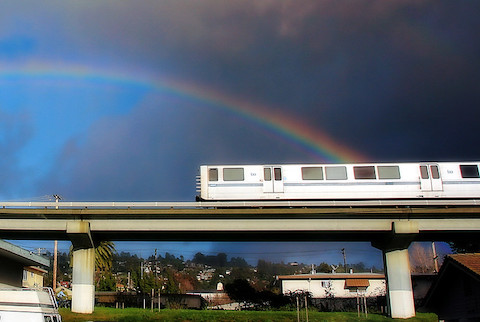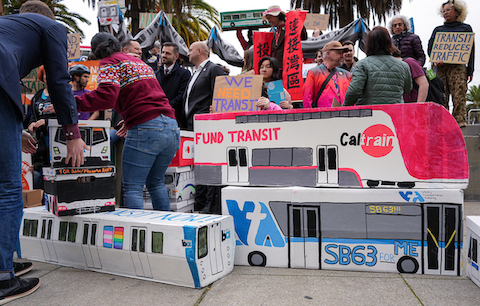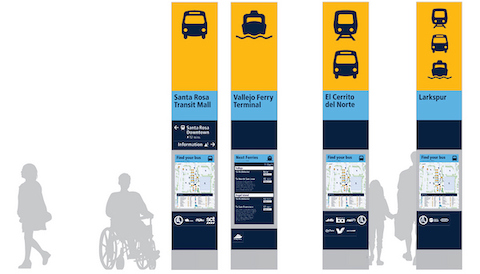
14 Oct Struggling Agencies Rejoice as Newsom Signs Legislation to Put Transit Sales Tax on Ballot

(“Under the Rainbow” by TJ Gehling via Flickr / CC BY-NC-ND 2.0 license)
By Andres Jimenez Larios
Bay City News
Gov. Gavin Newsom on Monday signed legislation that will put the decision to impose a regional sales tax to help close the budget deficits of major Bay Area public transit agencies in the hands of voters.
Senate Bill 63, also known as the Connect Bay Area Act, adds a regional measure on the 2026 ballot to the counties of Alameda, Contra Costa, San Mateo, Santa Clara, and San Francisco. It will allow voters to decide on a 14-year sales tax that would directly be distributed to transit agencies – a half-cent in Alameda, Contra Costa, San Mateo, and Santa Clara counties and one cent in San Francisco.
Revenue will be disbursed directly to some of the larger transit operators, while other funds will be provided to smaller county transit authorities which, in turn, will be able to provide funding for smaller transit agencies and transit-related projects.
BART, the Alameda/Contra Costa Transit District, Muni, Caltrain, the San Francisco Bay Ferry and Golden Gate Transit would be the primary beneficiaries of the sales tax.
The Metropolitan Transportation Commission, a region-wide planning body for transit, estimated agencies could be facing a combined $900 million budget shortfall at the beginning of fiscal year 2027.
A sales tax, according to independent analysts hired by the MTC, could generate enough revenue to help close the funding gap and keep the agencies running.
State Sens. Scott Wiener, D – San Francisco, and Jesse Arreguin, D – Berkeley, played a large role in crafting and pushing for the passage of Senate Bill 63.
“The Bay Area runs on transit, and this measure will allow it to keep running for many years to come,” said Wiener in a statement. “We still have a long road ahead to secure the future of our trains and buses, but with the enactment of SB 63 and the (San Francisco) Mayor’s funding measure for Muni, we have a clear path to stabilizing the system.”
Transit directors from the East Bay to the Peninsula echoed their support of the passage of Senate Bill 63, hoping it will win voters’ approval and keep the Bay Area moving.
BART General Manager Bob Powers was one of them.
“The BART Board of Directors supported SB 63 because it will cover a significant portion of BART’s operating deficit caused by remote work and will allow us to maintain current service levels and improve the rider experience,” he said in a Monday release by the agency.
Julie Kirschbaum, the director of transportation for the San Francisco Municipal Transit Agency, called the signing of the legislation “historic” and praised Wiener and Arreguin for their work on the bill.
The SFMTA is facing a budget deficit of $307 million beginning in July 2026, despite recovering ridership, the agency said.
“Everyone who takes transit around the Bay Area needs transit to survive and thrive,” said Kirschbaum in a statement released by her office. “And those who take transit rarely or not at all still depend on it to relieve congestion and help our environment.”
Besides funding for operations at transit agencies, the proposed sales tax would also help fund Clipper START – the transit pass program for qualifying low-income individuals – and accessibility projects for seniors and people with disabilities.
An additional oversight committee would be set up to ensure the distribution of funds are allocated appropriately.
Copyright © 2025 Bay City News, Inc. All rights reserved. Republication, rebroadcast or redistribution without the express written consent of Bay City News, Inc. is prohibited. Bay City News is a 24/7 news service covering the greater Bay Area.






No Comments